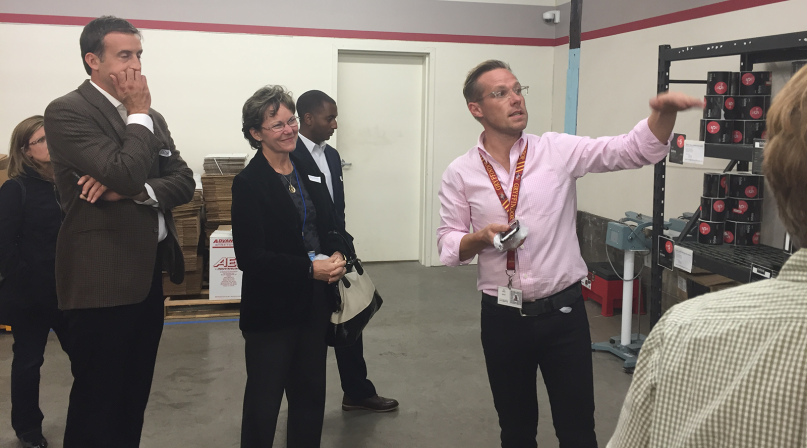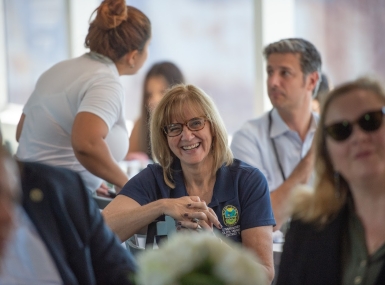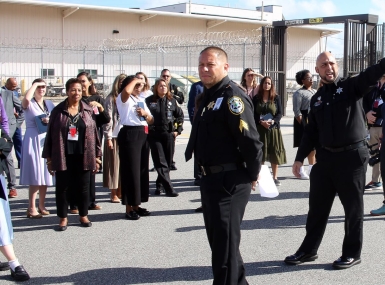Speakers bring experiences to LUCC attendees

(l-r) Tim Moxey shows off the new warehouse for this edible marijuana production facility, Spot Edibles, in King County, Wash. as Councilwoman Kathy Lambert looks on. The tour was part of a look at the legal cannabis industry in Washington state during the LUCC leadership symposium. Photo by Charlie Ban
Share | @NACoTweets: Local experts in tech, law enforcement, agriculture and pot present to #LUCC |
Large Urban County Caucus Leadership Symposium attendees heard from several speakers native to King County, Wash. with different expertise to offer.
Microsoft engineer James Whitaker explored the frontier of technological innovation and charted the path for where humanity is headed and its new role during his address at the annual LUCC Leadership Symposium held this year in King County.
Noting a roughly 10-year trend cycle, he explained how the hardware advances of the 1980s gave way to a software boom in the ‘90s, search dominated the 2000s before specialization, as seen in app development for smartphones, is the state of the art. App development paves the way for more diagnostic technology that can take care of itself, such as reordering supplies for maintenance and repair. A case in point — his hot tub.
“I remember the first time the [delivery] man came to my door with a box of hot tub chemicals,” he said. “I opened it up and showed the hot tub and said, ‘look what you did!’”
Those processes will streamline when three-dimensional printers are integrated into items and are able to manufacture replacement parts on site. What we’re looking at now, he said, is technology that will have so much information that it will be able to anticipate our needs and act on that. That can frighten a lot of people, economically — because they can displace workers — and philosophically.
But “as powerful as machines seem, they remain limited in comparison to human ingenuity and consciousness, which we cannot yet engineer. They can perform technical functions, like transportation and basic medical diagnoses, and allow humans to use their intellect to reach higher.”
Whittaker pointed to the Human Brain Project research effort as an example of how our technological skill in indexing and using data will help humanity create a comprehensive model of the brain, and what that could mean.
“We’re going to cure anxiety and depression,” he said. “We’re going to cure bipolar and schizophrenia. We’re going to be super learners, we’re going to figure out how we can use these machines that we’re so scared of to map our human brain.
“The machines aren’t going to take over, the machines are going to supercharge us.”
But before salvation by technology arrives, local government leaders need to grapple with an expanding conflict between police and the citizens they serve.
U.S. Rep. William Reichert (R-Wash.) voiced his concerns about the friction between law enforcement and the public in cities across the country at another LUCC Symposium event.
“Every community has to wrestle with this, and every community has a different solution to it,” he said. “The federal government can’t be the one that comes in and sets the standards and says this is what you’re going to do and this is how you’re going to do it. I really believe we’ve gone about this in totally the wrong way.
He drew on his experience as a deputy in the King County Sheriff’s Office, before serving as sheriff, to offer a general solution.
“We were able to build a relationship between police and the community,” he said. “It wasn’t through texting or Skyping, it was because the neighborhood that I worked in was the neighborhood that I worked in. I was there every day. I knew what cars should be in driveways, who should be walking around the street, who should do this job, who should do that job. You walked around and shook hands and you greeted people and you talked to them.
“So, you know when you-know-what hit the fan and Deputy Dave showed up, they trusted me.”
He also had a few words to say about architectural determinism in law enforcement.
“You know what we’re going to do if we build more jails?” he asked. “We’re going to fill them up.”
Field Trips
A bus tour of eastern King County gave officials from urban counties the Rural Action Caucus experience. The county’s agricultural production district includes more than 42,000 acres designated for agriculture, all within a 45-minute drive of an urban market for their goods.
A stop at a fourth-generation family dairy farm gave an up-close view of the challenges the farming business faces, including a probably familiar long wait for a permit to clean a ditch.
Other attendees toured facilities involved in Washington state’s newest industry—legal cannabis. Though a state referendum legalized marijuana sale, it also allowed counties to legislate its legality in their borders and prohibited vertical integration, so growth, production and retail are all separated.
Tim Moxey, who owns a production facility, said he chose that part of the supply chain because his business was not limited the way growers are, and described the regulatory environment in which he operates.
Counties receive only a small portion of the excise taxes collected from marijuana sales.
Attachments
Related News

The County Countdown – October 23, 2023
Watch this week's County Countdown for the latest federal advocacy updates on topics related to counties and the intergovernmental partnership.

Not all urban counties have the same housing solution, but they have the same problem
County officials discussed housing affordability at NACo’s Large Urban County Caucus symposium in Orange County, Fla.

Florida county jail addresses mental health crisis
Orange County, Fla.’s Belvin Perry Jr. Central Receiving Center diverts people experiencing a mental health or substance use crisis from incarceration, connecting them to care and resources, while also relieving hospital emergency departments and reducing recidivism and jail costs.
